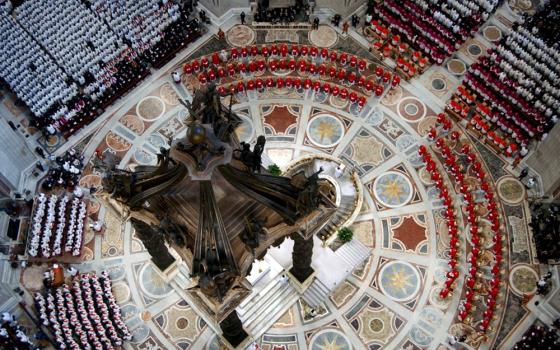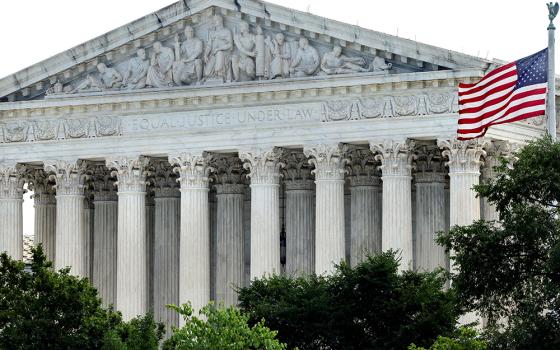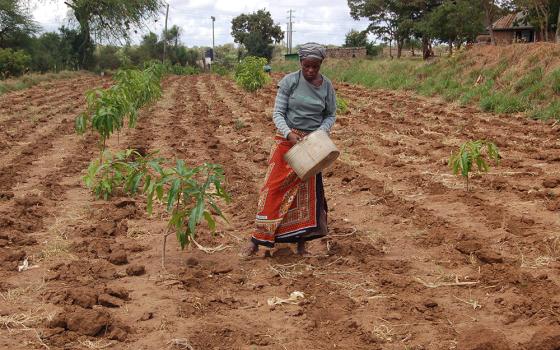Viewpoint
The Web site of the Holy See, under the section on the Pontifical Academy of Sciences, carries information about a study week being planned on “Transgenic Plants for Food Security in the Context of Development,” to be held May 2009 in Rome.
This seems laudable, except for the fact that what follows is a totally one-sided campaign to promote genetically modified crops.
The misrepresentation begins on Page 2, which features a photo of Pope Benedict XVI with arms outstretched, ready to embrace the world and, presumably, this new technology. Once you read the text, it’s obvious that while the pope is concerned about the effects of the world’s financial crisis on the price of food for the poor, he is not embracing genetically modified crops.
When you move on to look at topics and presenters, 18 out of 39 contributors are from the United States. The U.S. agricultural model being promoted is hardly fit for the majority of countries in the world, such as India or the Philippines. As far as I know, there are more people in U.S. jails than working on U.S. farms. This model is dependent on machines and heavy use of chemical fertilizers. If the U.S. model was replicated in India and China, where would the hundreds of millions of people who now work on the land go? Further, the direction U.S. agriculture has taken in recent decades has been dictated by giant agribusiness corporations that have made fortunes selling their seeds and agrochemicals to farmers.
As far as I can ascertain, every speaker at the study week is a proponent of genetically modified crops -- some of them militant, as in the case of Drs. Peter Raven and C.S. Prakash.
It borders on the bizarre that an institution that claims to be an academy of sciences would host an event on an issue as contentious as genetically engineered food without having representatives from both sides of the argument present. Challenging so-called accepted positions in pursuit of the truth has been part of the intellectual tradition of Europe since Plato. The scientific tradition has built on such a culture of vigorous debate, with the added insight that everything in science is revisable in the light of new evidence. It is by means of this self-corrective critical methodology that science has made such strides.
Marketing, advertising and propaganda operate in a different way. Here there is no space or opportunity for raising thorny questions or particular claims about facts. Everything must be accepted on the word of so-called “experts.”
The debate over genetically modified crops is crucially important for the well-being of humans on earth.
The constant mantra of the study week, as presented in the abstracts from presenters, is that genetically modified crops will feed the hungry and alleviate poverty, and that the current regulatory regime for genetically modified crops is much too restrictive.
Despite the fact that genetically modified crops are being forced on many countries in the world by powerful agribusiness companies such as Monsanto and successive U.S. governments, the presenters would have us believe that they are somehow victims of some great conspiracy. They portray themselves as little David in the struggle against Goliath.
In this world, the biotech industry is portrayed as the knight in shining armor, a kind of secular St. Vincent de Paul Society, totally focused on feeding the poor.
Anyone tempted to believe this nonsense should read the May 2008 article in Vanity Fair by Pulitzer Prize winners Donald L. Bartlett and James B. Steele about the real Monsanto. The title and subtitle say it all: Monsanto’s Harvest of Fear: Ruthless Legal Battles Against Small Farmers. With Monsanto and other agribusinesses, profits come before anything else.
The Pontifical Academy has an obligation to be properly informed about such a vital issue as the future of food. One of the strengths of the Catholic church is its universality and involvement in so many enterprises and activities all over the globe.
Surely the academy’s chancellor, Bishop Marcelo Sánchez Sorondo, should have asked someone at Caritas Internationalis or any of the Catholic development agencies such as Britain’s Catholic Agency for Overseas Development or the National Secretariat for Social Action, the social arm of the bishops’ conference in the Philippines, whether genetically modified crops have been a help or hindrance in alleviating poverty or feeding the hungry.
Fr. Sean McDonagh is an Irish Columban missionary priest who worked on the island of Mindanao in the Philippines for more than 20 years. His books include To Care for the Earth: A Call to a New Theology (Bear & Co.) and The Greening of the Church (Orbis).
Printed in the National Catholic Reporter, February 20, 2009.




